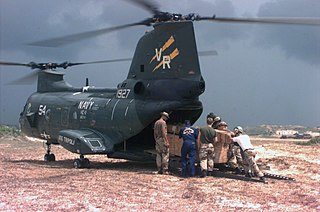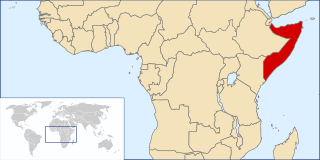
Peacekeeping comprises activities, especially military ones, intended to create conditions that favor lasting peace. Research generally finds that peacekeeping reduces civilian and battlefield deaths, as well as reduces the risk of renewed warfare.

The United Nations Mission in Liberia (UNMIL) was a United Nations peacekeeping operation established in September 2003 to monitor a ceasefire agreement in Liberia following the resignation of President Charles Taylor and the conclusion of the Second Liberian Civil War (1999–2003). At its peak it consisted of up to 15,000 UN military personnel and 1,115 police officers, along with civilian political advisors and aid workers.

The Somali Civil War is an ongoing civil war that is taking place in Somalia. It grew out of resistance to the military junta which was led by Siad Barre during the 1980s. From 1988 to 1990, the Somali Armed Forces began engaging in combat against various armed rebel groups, including the Somali Salvation Democratic Front in the northeast, the Somali National Movement in the northwest, and the United Somali Congress in the south. The clan-based armed opposition groups overthrew the Barre government in 1991.

The Unified Task Force (UNITAF) was a United States-led, United Nations-sanctioned multinational force which operated in Somalia from 5 December 1992 until 4 May 1993. A United States initiative, UNITAF was charged with carrying out United Nations Security Council Resolution 794 to create a protected environment for conducting humanitarian operations in the southern half of the country.

United Nations Security Council Resolution 1706, adopted on August 31, 2006, after recalling previous resolutions on the situation in Sudan, including resolutions 1556 (2004), 1564 (2005), 1574 (2004), 1590 (2004), 1591 (2005), 1593 (2004), 1663 (2006), 1665 (2006) and 1679 (2006), the Council expanded the mandate of the United Nations Mission in the Sudan (UNMIS) to include deployments in Darfur to enforce the Darfur Peace Agreement.

The African Union Mission in Somalia (AMISOM) was a Multinational force formed by the African Union. The operation deployed to Somalia soon after the Islamic Courts Union was deposed by troops from Ethiopia during a large scale invasion in late 2006. The missions primary objective was to maintain the regime change between the ICU and the newly installed Transitional Federal Government, implement a national security plan and train the TFG security forces. As part of its duties, AMISOM later supported the Federal Government of Somalia in its war against Al-Shabaab. AMISOM was the most deadly peacekeeping operation in the post-war era.

Pakistan has served in 46 United Nations peacekeeping missions in 29 countries around the world. As of 2023, United Nations (UN) statistics show that 168 Pakistani UN peacekeepers have been killed since 1948. The biggest Pakistani loss occurred on 5 June 1993 in Mogadishu. Pakistan joined the United Nations on 30 September 1947, despite opposition from Afghanistan because of the Durand Line issue. The Pakistan Armed Forces are the sixth largest contributor of troops towards UN peacekeeping efforts, behind Ethiopia and Rwanda.

The African Union-United Nations Hybrid Operation in Darfur was a joint African Union (AU) and United Nations (UN) peacekeeping mission formally approved by United Nations Security Council Resolution 1769 on 31 July 2007, to bring stability to the war-torn Darfur region of Sudan while peace talks on a final settlement continue.
The United Nations Support Office for AMISOM (UNSOA) was a field support operation led by the United Nations Department of Field Support (DFS). It was located in Mogadishu and Nairobi in East Africa, focused on support of the African Union Mission in Somalia (AMISOM).

United Nations Security Council Resolution 1910, adopted unanimously on January 28, 2010, after hearing recommendations from the Secretary-General and recalling resolutions 1325 (2000), 1612 (2005), 1674 (2006), 1738 (2006), 1820 (2008), 1863 (2009), 1882 (2009), 1888 (2009) and 1894 (2009), the Council authorised the mandate of the African Union Mission to Somalia (AMISOM) to be extended until January 31, 2011, asking it to increase its strength to carry out its mandate.

United Nations Security Council resolution 1509, adopted unanimously on 19 September 2003, after recalling all previous resolutions on the situation in Liberia, including Resolution 1497 (2003), the council established the 15,000-strong United Nations Mission in Liberia (UNMIL) to assist in implementing a ceasefire and peace agreement.

United Nations Security Council Resolution 1964, adopted unanimously on December 22, 2010, after recalling previous resolutions on the situation in Somalia, the Council authorised the continuation of the mandate of the African Union Mission to Somalia (AMISOM) until September 30, 2011, and increased its size from 8,000 to 12,000 personnel.
United Nations Security Council Resolution 1725, adopted unanimously on December 6, 2006, after recalling previous resolutions on the situation in Somalia, particularly resolutions 733 (1992), 1356 (2001) and 1425 (2002), the Council authorised the Intergovernmental Authority on Development (IGAD) and African Union to establish a protection and training mission in the country.

United Nations Security Council Resolution 2010 was unanimously adopted on 30 September 2011.
United Nations Security Council Resolution 1744, adopted unanimously on 20 February 2007, authorizing the African Union mission replacing and subsuming the IGAD Peace Support Mission in Somalia or IGASOM, which was a proposed Intergovernmental Authority on Development protection and training mission to Somalia approved by the African Union on 14 September 2006. IGASOM was also approved by the United Nations Security Council on 6 December 2006.
United Nations Security Council Resolution 1801 was unanimously adopted on 20 February 2008.
United Nations Security Council Resolution 1814 was unanimously adopted on 15 May 2008. The resolution called for the United Nations to provide economic, political and technical support to Somalia, with a possible UN peacekeeping force.
United Nations Security Council Resolution 1872 was unanimously adopted on 26 May 2009.
United Nations Security Council Resolution 1831 was unanimously adopted on 19 August 2008.

The African-led International Support Mission to the Central African Republic was an African Union peacekeeping mission to the Central African Republic. It was established on 5 December 2013 by United Nations Security Council resolution 2127 to stabilise the country as a result of the Central African Republic conflict under the Djotodia administration and following the 2013 Central African Republic coup d'état.













